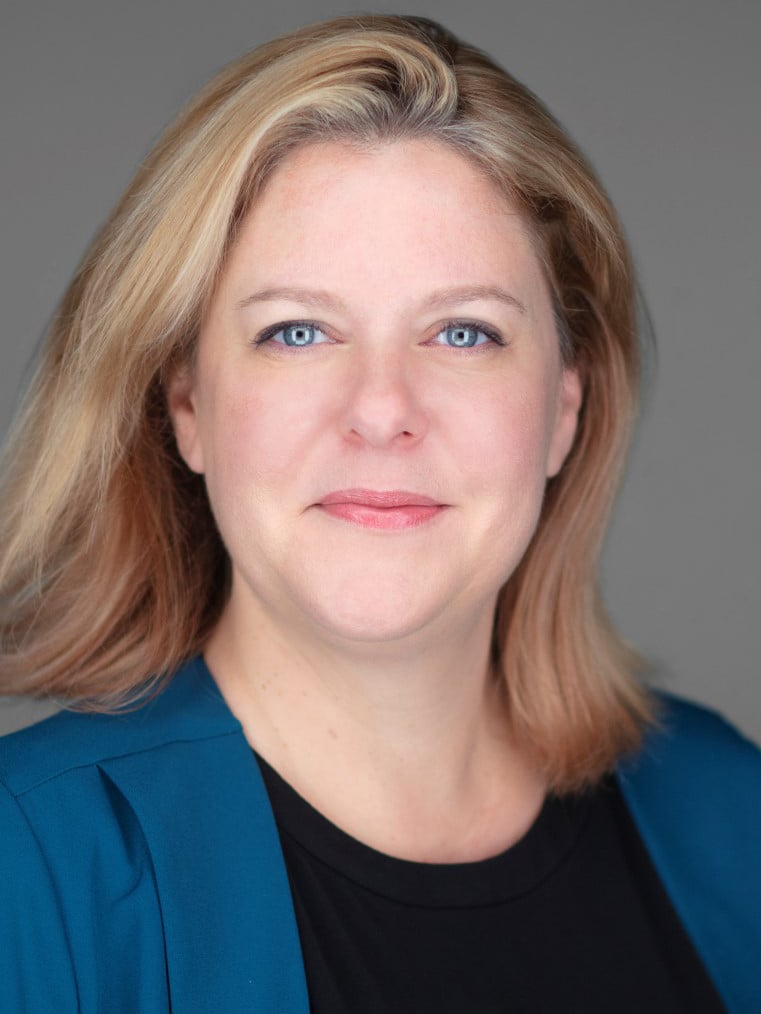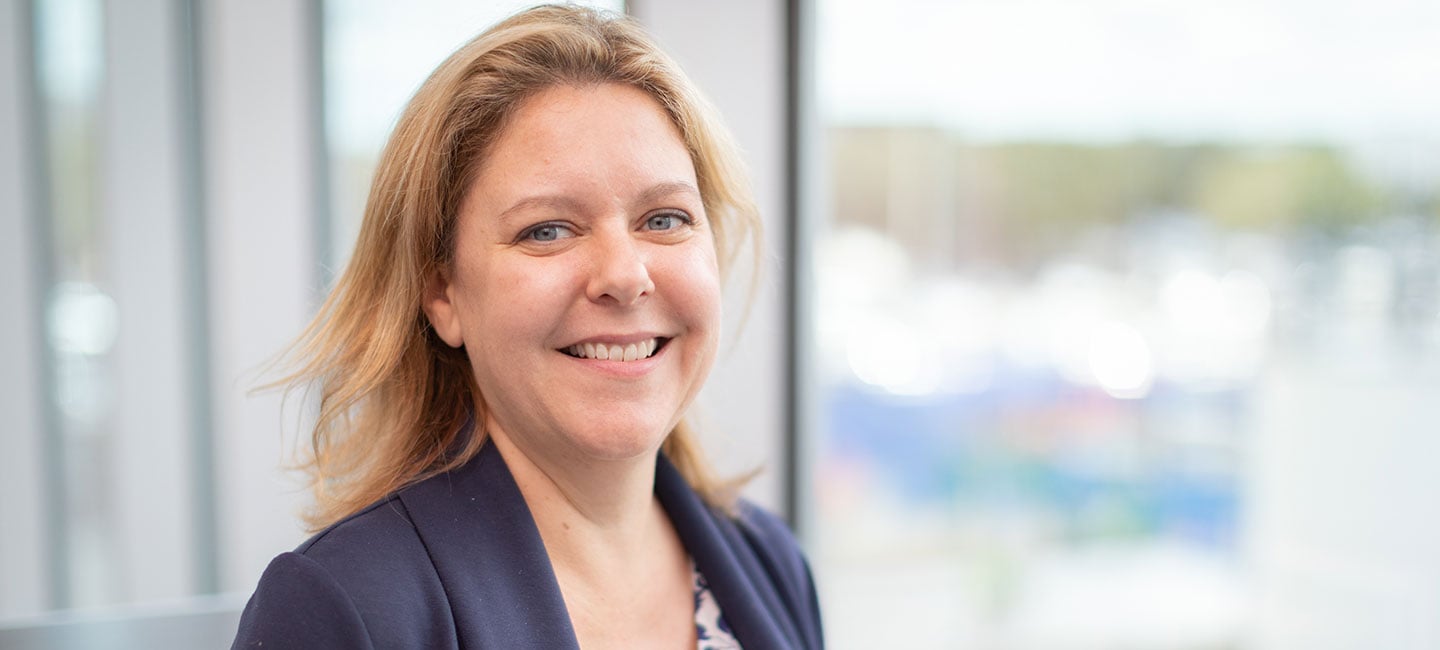Battling Burnout
A younger Dr. Jennifer Bickel would have rolled her eyes at the idea of a chief wellness officer.
The youngest of five children, Bickel watched her mother attend nursing school in her 40s. She was drawn to the medical books she saw around the house, and watched her older sisters follow in their mother’s footsteps and become nurses.
By her teenage years, Bickel knew she would also be called into medicine. She felt that call so strongly she enrolled in a six-year combined undergraduate and medical school at the University of Missouri-Kansas City. There, she loved every clinical rotation, but found a passion for neurology while volunteering for hospice care.
“Neurology was something that would allow me to treat people from across the lifespan,” said Bickel. “I loved the fact that you had to understand people’s stories in order to understand their conditions.”
Bickel became a neurologist, treating both children and adults over the span of her clinical career. She also focused her training and education on headaches and acupuncture.
A Second Calling
After establishing herself in her clinical role, Bickel took on many leadership positions, including chief of the Headache Section at Children’s Mercy Hospital in Kansas City, Missouri, where she oversaw the care of more than 9,000 patients a year. She became a professor of pediatrics and neurology at her alma mater, as well as the founding program director for an accredited Headache Medicine fellowship program.
In 2018, Bickel was named the medical director of the Center for Professional Well-Being at Children’s Mercy, where she built programs for staff support and promoted system changes by emphasizing well-being in hospital operations, including adding burnout rates to hospitalwide metric goals. In 2020, she added COVID Employee Wellness Officer to her resume.
For all her hard work, Bickel was awarded the Department of Pediatrics Mentoring Senior Achievement Award in 2018, the Department of Pediatrics Clinical Care Award in 2019 and the COVID Leadership Team Award in 2020. Through these awards, Bickel was recognized out of more than 500 physicians for her dedication to leadership, patient care and mentoring of junior faculty.
Although Bickel had firmly established herself as a health care leader, she never saw herself pivoting from serving patients in a clinical setting to a mostly administrative role. But as she saw the increasing need for improved wellness among health care providers, she recognized the importance of her unique skill set.
“It was challenging to realize being a clinician-educator was not going to be my path,” Bickel said. “But just like how I felt I was called into medicine, I felt like I was being called into improving well-being in health care. What ultimately made my decision to transition into that role was that if I can improve the well-being of those who work in health care, I can affect so many more patients than I could as a physician alone.”
After spearheading countless improvements in Kansas City, such as creating support groups, enhancing leadership development and providing social networking opportunities, Bickel became Moffitt Cancer Center’s first ever chief wellness officer in 2021. The job is a new role, only formed in health care over the past few years, and a role that is more important than ever in a post-COVID-19 world.
“A chief wellness officer fills the gap of the well-being needs in health care that are particular to that organization and national gaps,” said Bickel. “The role is really about how we look at well-being as one of the top resources and values within the organization.”
At Moffitt, Bickel is addressing work-related issues such as burnout and helping to create new systems that optimize the opportunity for well-being. “Just as a construction worker would get a hard hat, we have to build programs such as peer support, coaching and other interventions to help with some of the struggles that come with the job,” she said.
“Wellness is all about meaning and work, so the more we’re able to get people to do their meaningful work, such as the research they want to do, the taking care of patients or the teaching they want to do, instead of less meaningful tasks,” said Bickel.
‘We Can Do Better’
Bickel understands why some may be skeptical of her new job, not only because the role is so new, but also because views about what causes and improves burnout have been wrong in the past. However, she thinks now is the perfect time to right those wrongs and shift views to recognize the great need for improved well-being in health care.
The pandemic has put a spotlight on clinician well-being, and national support has been growing. The National Academy of Medicine is working with regulatory bodies to decrease certain regulation requirements in order to improve provider well-being, and this past summer, the Health Resources and Services Administration announced a more than $100 million grant to help reduce burnout and promote mental health among health care workers.

“I fundamentally believe that we can do better, and that’s what I am dedicating my career towards,” said Bickel. “We’ve got national supporters moving in that direction, but these things take time. Think about how long it took people to quit smoking. So, this is going to take a while, but at least it’s started across the country.”
Bickel says Moffitt has an even bigger head start; the cancer center launched a national search for a chief wellness officer well before other health care institutions and already has initiatives in place like the Thrive Program, a peer-to-peer support program, and other coaching opportunities. Human Resources also provides top-notch support and benefits. Bickel’s goal is to build on those programs to offer even more chances for self-care and employee recognition, but she also wants team members to recognize they, too, have a responsibility if the system is going to improve.
“We have to look at this from not just what is the system going to do? What is the organization going to do to improve my well-being?” she said. “But what am I actively doing myself? What am I doing for my team?”
Finding a Shared Purpose
Bickel’s desk is covered in Post-it notes, a different idea scribbled on each. She spent her first few months at Moffitt in the exploratory phase and is excited to start implementing meaningful changes in early 2022. She is pulling from her experience in national leadership roles in advocacy and education, such as the Chair of the American Academy of Neurology Wellness Subcommittee and reviewer for the Patient-Centered Outcomes Research Institute, and her wellness initiatives are rooted in models developed by the National Academy of Medicine’s Action Collaborative on Clinician Well-Being and Resilience and the American Medical Association. She is excited to tailor those models to fit Moffitt’s unique needs.
Bickel also practices what she preaches and makes sure she finds time in her busy schedule for self-care, which includes practicing gratitude every night. She is a mom to four boys ages 8 to 23, and her family enjoys their new proximity to the beach. Bickel also loves cooking pizza and pasta and makes soaps and lotions from scratch.
She hopes she can combine her ideas on burnout and work-life balance to make Moffitt one of the healthiest places for providers and faculty to work, which will in turn help promote Moffitt’s lifesaving mission.
“One of the reasons I was drawn to Moffitt is because of the universally shared meaning, purpose and mission,” said Bickel. “Shared mission, shared values and meaning are basically antidotes for burnout.”



